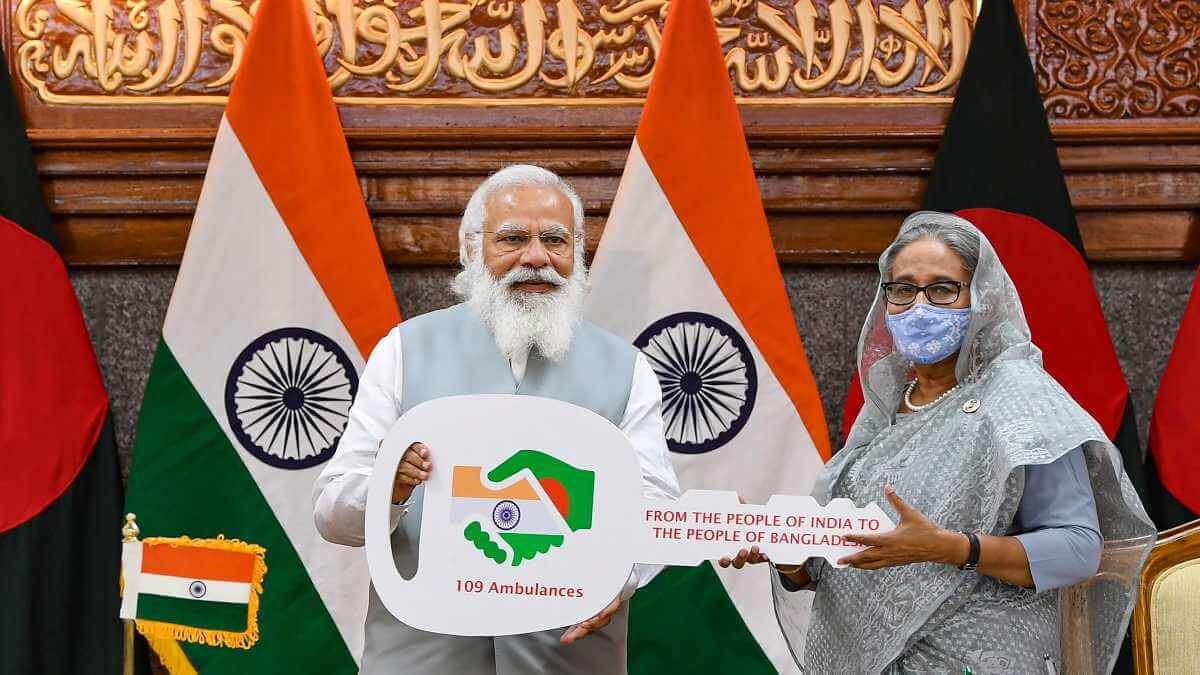Indian Prime Minister Narendra Modi conducted a two-day visit to Bangladesh from March 26-27, 2021. This was the Indian premier’s first foreign tour since the beginning of the COVID-19 pandemic. According to a statement by the Prime Minister’s Office (PMO), the visit “symbolised the partnership of half-a-century between India and Bangladesh that has strengthened, matured and evolved as a model for bilateral relations for the entire region.”
On his first day in the capital city of Dhaka, Modi attended the country’s National Day Celebration—marking Bangladesh’s 50th Independence Day—as the Guest of Honour. The Prime Minister also visited the National Martyrs’ Memorial at Savar, where he laid a wreath in memory of those who fought for the nation’s freedom. Further, the leader held talks with Bangladeshi foreign minister Dr. AK Abdul Momen, wherein the officials reportedly discussed ways to strengthen their countries’ strategic partnership.
On his second and final day, Modi, along with his Bangladeshi counterpart Sheikh Hasina, visited Sheikh Mujibur Rahman’s mausoleum in Tungipara to pay respects to the leader. He also visited two historic Hindu temples at Satkhira and Orakandi. Both locations are important places of worship for the Hindu Matua community—a large number of whom also live in West Bengal—whose vote is expected to be crucial in determining the winners in about 30-50 assembly constituencies in the state assembly elections (which also began on Saturday).
“My visit to the Orakandi Thakurbari is an experience I will remember for life. This is a very sacred place, which is closely associated with the Matua community,” Modi tweeted following his visit.
Later in the day, the two prime ministers held one-on-one talks, which was then followed by a delegation-level meet between the two sides. The leaders discussed the state of bilateral relations and reviewed the progress made in areas such as health, trade, technology, connectivity, water-sharing, energy, and developmental cooperation. Building on their ongoing coordination in tackling the coronavirus crisis, Modi also donated 1.2 million doses of the AstraZeneca COVID-19 vaccine to Bangladesh to ensure sufficient domestic supply. Dhaka has already inked an agreement with the Serum Institute of India for 30 million doses of the vaccine, of which 5 million have already been delivered. India assured Bangladesh on Saturday that would do its best to facilitate the prompt delivery of the remaining tranches of the shots, “in accordance with its domestic exigencies and international commitments.”
The parties also signed five MoUs, relating to: disaster management and mitigation; establishment of a framework of cooperation in the area of trade remedial measures; supply of ICT equipment, books and training for the Bangladesh-Bharat Digital Service and Employment Training Centre; establishment of sports facilities at Rajsahi College; and cooperation between the Bangladesh National Cadet Corps and India’s National Cadet Corps.
Despite talks of allyship and increased trust and cooperation between the two sides, Modi’s visit to Bangladesh was also met with severe resistance from certain factions. An Islamist group called Hefazat-e-Islam led street protests denouncing the leader’s treatment of Muslims in India on Friday. However, the demonstrations quickly spread and turned violent—with buses, trains and temples being vandalised—after police opened fire on protesters, killing at least 10 over the weekend. “Police opened fire on our peaceful supporters,” Hefazat-e-Islam’s organising secretary Azizul Haque told a rally in Chittagong on Saturday. “We will not let the blood of our brothers go in vain.”
PM Modi’s Visit to Bangladesh: What You Need to Know
This was the Indian premier’s first foreign tour since the beginning of the COVID-19 pandemic.
March 30, 2021

SOURCE: PTI via THE PRINT
